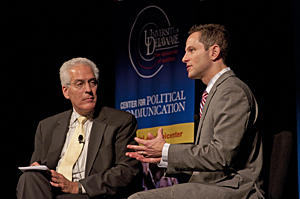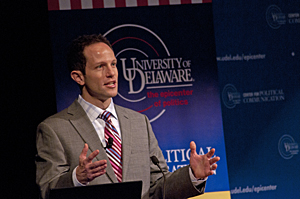
ADVERTISEMENT
- Rozovsky wins prestigious NSF Early Career Award
- UD students meet alumni, experience 'closing bell' at NYSE
- Newark Police seek assistance in identifying suspects in robbery
- Rivlin says bipartisan budget action, stronger budget rules key to reversing debt
- Stink bugs shouldn't pose problem until late summer
- Gao to honor Placido Domingo in Washington performance
- Adopt-A-Highway project keeps Lewes road clean
- WVUD's Radiothon fundraiser runs April 1-10
- W.D. Snodgrass Symposium to honor Pulitzer winner
- New guide helps cancer patients manage symptoms
- UD in the News, March 25, 2011
- For the Record, March 25, 2011
- Public opinion expert discusses world views of U.S. in Global Agenda series
- Congressional delegation, dean laud Center for Community Research and Service program
- Center for Political Communication sets symposium on politics, entertainment
- Students work to raise funds, awareness of domestic violence
- Equestrian team wins regional championship in Western riding
- Markell, Harker stress importance of agriculture to Delaware's economy
- Carol A. Ammon MBA Case Competition winners announced
- Prof presents blood-clotting studies at Gordon Research Conference
- Sexual Assault Awareness Month events, programs announced
- Stay connected with Sea Grant, CEOE e-newsletter
- A message to UD regarding the tragedy in Japan
- More News >>
- March 31-May 14: REP stages Neil Simon's 'The Good Doctor'
- April 2: Newark plans annual 'wine and dine'
- April 5: Expert perspective on U.S. health care
- April 5: Comedian Ace Guillen to visit Scrounge
- April 6, May 4: School of Nursing sponsors research lecture series
- April 6-May 4: Confucius Institute presents Chinese Film Series on Wednesdays
- April 6: IPCC's Pachauri to discuss sustainable development in DENIN Dialogue Series
- April 7: 'WVUDstock' radiothon concert announced
- April 8: English Language Institute presents 'Arts in Translation'
- April 9: Green and Healthy Living Expo planned at The Bob
- April 9: Center for Political Communication to host Onion editor
- April 10: Alumni Easter Egg-stravaganza planned
- April 11: CDS session to focus on visual assistive technologies
- April 12: T.J. Stiles to speak at UDLA annual dinner
- April 15, 16: Annual UD push lawnmower tune-up scheduled
- April 15, 16: Master Players series presents iMusic 4, China Magpie
- April 15, 16: Delaware Symphony, UD chorus to perform Mahler work
- April 18: Former NFL Coach Bill Cowher featured in UD Speaks
- April 21-24: Sesame Street Live brings Elmo and friends to The Bob
- April 30: Save the date for Ag Day 2011 at UD
- April 30: Symposium to consider 'Frontiers at the Chemistry-Biology Interface'
- April 30-May 1: Relay for Life set at Delaware Field House
- May 4: Delaware Membrane Protein Symposium announced
- May 5: Northwestern University's Leon Keer to deliver Kerr lecture
- May 7: Women's volleyball team to host second annual Spring Fling
- Through May 3: SPPA announces speakers for 10th annual lecture series
- Through May 4: Global Agenda sees U.S. through others' eyes; World Bank president to speak
- Through May 4: 'Research on Race, Ethnicity, Culture' topic of series
- Through May 9: Black American Studies announces lecture series
- Through May 11: 'Challenges in Jewish Culture' lecture series announced
- Through May 11: Area Studies research featured in speaker series
- Through June 5: 'Andy Warhol: Behind the Camera' on view in Old College Gallery
- Through July 15: 'Bodyscapes' on view at Mechanical Hall Gallery
- More What's Happening >>
- UD calendar >>
- Middle States evaluation team on campus April 5
- Phipps named HR Liaison of the Quarter
- Senior wins iPad for participating in assessment study
- April 19: Procurement Services schedules information sessions
- UD Bookstore announces spring break hours
- HealthyU Wellness Program encourages employees to 'Step into Spring'
- April 8-29: Faculty roundtable series considers student engagement
- GRE is changing; learn more at April 15 info session
- April 30: UD Evening with Blue Rocks set for employees
- Morris Library to be open 24/7 during final exams
- More Campus FYI >>
4:31 p.m., Oct. 21, 2010----Kenneth Vogel, a reporter for Politico.com, discussed campaign financing in a talk titled “Political Speech After Citizens United” on Wednesday night, Oct. 20, in Mitchell Hall as part of the University of Delaware's National Agenda 2010 speaker series.
Vogel said that although there is a lot going on in this election cycle, the most significant development could be the “demise of the modern campaign finance regulation regime.”
“We're seeing such a flood of money into politics, and it's really changed the way that campaigns, parties, outside groups, big corporations, labor unions, everyone approaches the political system,” he said.
According to Vogel, a lot of the spending, although not all of it, can be traced to a court decision concerning Citizens United, a nonprofit organization that wanted to air on television a negative film about Hillary Clinton, titled Hillary: The Movie. That raised the question of whether the group could use corporate funds to air advertisements that promoted the movie, in light of the McCain-Feingold Act concerning campaign finance reform.
The case Citizens United v. Federal Election Commission eventually went to the U.S. Supreme Court, which found that it is unconstitutional for governments to pass laws that prohibit corporations -- and by extension labor unions -- from airing these types of ads, Vogel said.
Vogel went on to clarify that the decision “did not, as has been kind of suggested in some media accounts, allow for corporations and labor unions to give directly to candidates. That's still forbidden.”
The flood of money that corporations and unions have poured into political advertising has “changed the whole landscape of politics,” Vogel said. “It used to be that the parties and the candidates were the ones who were really dictating the messages. They were the ones that big donors wanted to give to. Now, those contributions, the amount that those candidates can raise, while still important, are taking a back seat to some extent to some of the stuff that these outside groups can do under this new law. Now, these outside groups, these corporations, are able to air ads directly that really take on candidates in a very sharp and pointed way.”
Detractors of the decision are worried that this will shift political power away from the parties and the candidates and hand it over to corporations, which can buy their way into the political process. There are also fears that this will diminish individual participation, with corporate dollars drowning out individual voices.
While Vogel conceded that he could “see the rationale of that argument,” he finished his talk by saying that “individuals still have the power. Voters still have the power. It's a democracy; you can't buy a vote, no amount of money is going to offset the message from the candidate. The challenge for the candidates, no matter how much money is coming in, is still going to be to reach voters on a personal level.”
National Agenda 2010 is sponsored by the University's Center for Political Communication and moderated by Ralph Begleiter, center director.
The next event will be an election eve UD Speaks presentation by Republican Karl Rove and Democrat Howard Dean on Monday, Oct. 25, at 8:30 p.m. in the Bob Carpenter Center.
Article by Adam Thomas
Photos by Duane Perry



